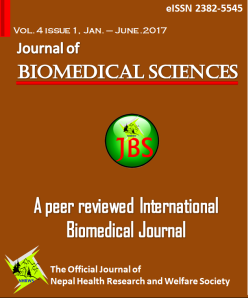Anti-inflammatory properties of Dirinaria consimilis extracts in albino rats
DOI:
https://doi.org/10.3126/jbs.v4i1.20572Keywords:
acute toxicity, Dirinaria consimilis (Stirton) D.D. Awasthi, paw oedema, protein denaturation methodAbstract
Background
Earlier, the lichens are used in traditional medicines by different cultures across the world. As the Dirinaria genus has been shown to be biologically active against inflammation in folklore, we assessed the in vitro and in vivo anti-inflammatory profile of Dirinaria consimilis.
Material and methods
Initially, the hydroalcoholic extract of lichen, D. consimilis (Dc-HE) was prepared and re-extracted with n-hexane, chloroform, ethyl acetate, acetone and methanol. The resultant extracts were evaluated for their in vitro (protein denaturation method), acute toxicity and in vivo (formalin-induced rat paw oedema assay) anti-inflammatory studies.
Results
Among all the tested extracts, the acetone and chloroform extract of D. consimilis depicted prominent anti-inflammatory activity in both the bioassays. The acetone extract inhibited protein denaturation with IC50 value of about 468 µg/mL while the standard (Indomethacin) with 120 µg/mL. Moreover, the Dc-HE was screened for acute toxicity studies in male albino rats up to 2000 mg/Kg b.w dosage. The in vivo anti-inflammatory analysis of acetone extract (200 mg/mL) showed potent reduction of rat paw oedema nearer to that of the standard, whereas chloroform extract depicted moderate depletion and the other extracts revealed mild inhibitory profile against inflammation.
Conclusion
This study reveals that the lichen, D. consimilis might be a good source of anti-inflammatory agents.
Downloads
Downloads
Published
How to Cite
Issue
Section
License
This license enables reusers to distribute, remix, adapt, and build upon the material in any medium or format, so long as attribution is given to the creator. The license allows for commercial use.




